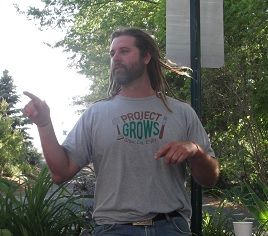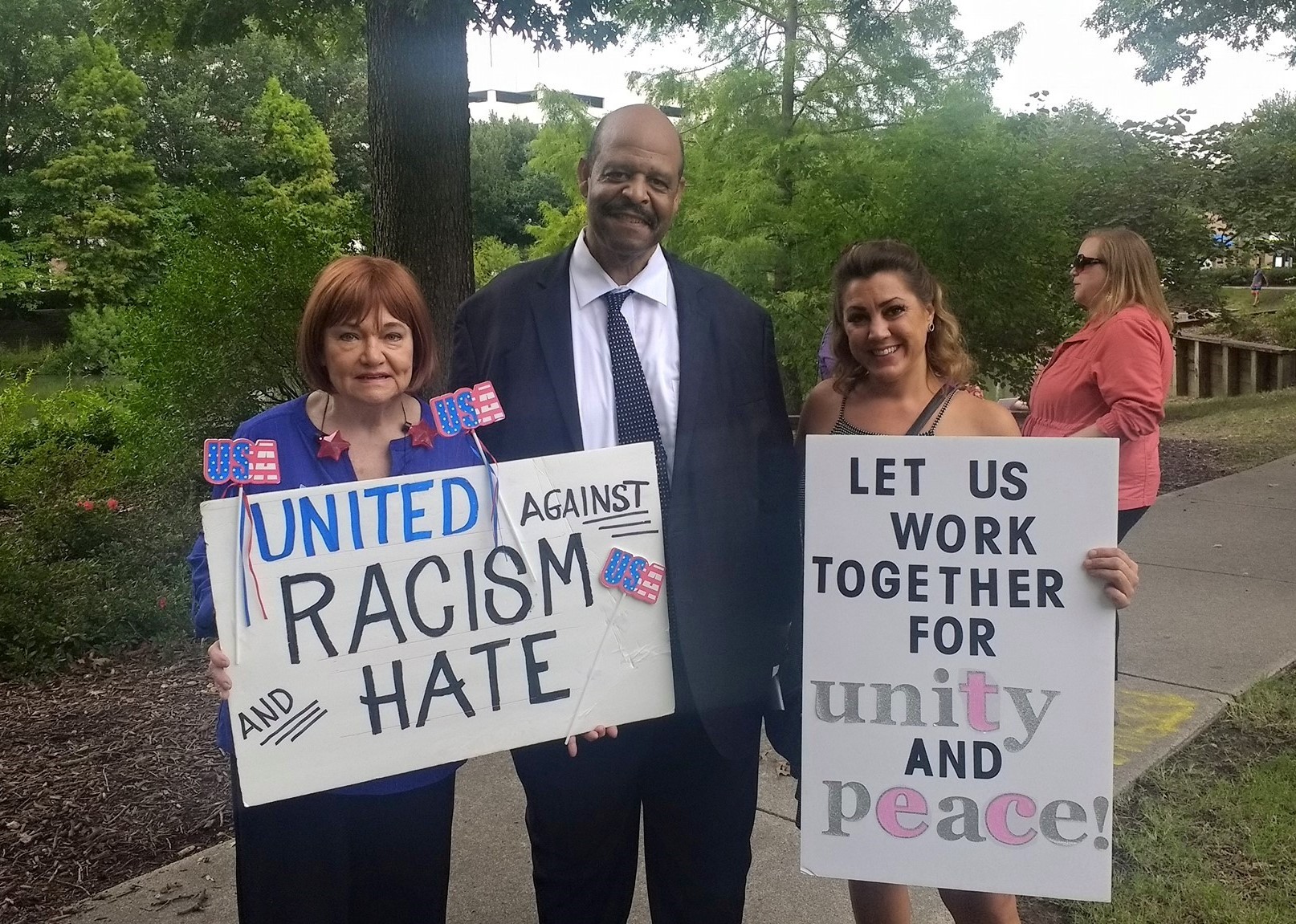 Ryan Blosser was raised in Waynesboro and a stand-out basketball player at Fishburne Military School who earned an athletic scholarship to play for a Division I college. That foray lasted a year, after which he began a circuitous journey to a farm in Churchville and Project GROWS in Verona.
Ryan Blosser was raised in Waynesboro and a stand-out basketball player at Fishburne Military School who earned an athletic scholarship to play for a Division I college. That foray lasted a year, after which he began a circuitous journey to a farm in Churchville and Project GROWS in Verona.
People often ask me “What happened to you?” I don’t look like the short-haired Fishburne basketball player that I was. – Ryan Blosser
Growing up, Blosser says, local food was Domino’s pizza and a gallon of orange juice. He spent all his time at the YMCA indoors. He didn’t know he was missing anything. When he went off to college he just did not like the experience. He quit. But basketball had been his entire identity. He met his future wife, Joy, and decided to move to Hawaii. It was on Oahu that his obsession with local food started.
Blosser sees his life as three woven tracks. First there is his need to engage his body somehow physically; an intellectual need, which being a college basketball player did not fulfill; and finally an emotional need. In Hawaii, the guy who had never been outside started to surf. Then he happened on a local farmer’s market and he bought and fell in love with a basil plant. Finally while taking a college course on poetry he discovered the haptic poets. The basil plant became his fetishized object.
This is going to really sound really, really “woo woo,” but I started to actually connect to the rhythm of the planet, not in that hippie kind of way, but in a real way where you are outside in the water and you actually feel it.
These experiences motivated him. He could grow his plant and eat it too. He could smell it, put it in his food and eat it, all without going to the store to buy it. To that point he had been living off of rice and beer; that was what the money they had bought. Then about 12 years ago, in a corner of his yard, he started an herb garden.
While studying creative writing at the University of Hawaii he came across the term “permaculture.” Blosser’s view of permaculture is very simple: designing useful human habitats by using nature as a model. “We get our needs from the environment and we design for those needs.”
Three tenets of permaculture:
- Care for the Earth
- Care for the people
- Return of surplus
Life was good in Hawaii. Then his wife got pregnant and he “freaked out.” They decided to come home. What he told his wife was that he wanted to buy land in the country and start a farm. She was not keen on the idea, but about nine years ago they bought some four acres of land near Churchville and he started tinkering with his idea of permaculture.
My wife said, “Poetry doesn’t make any money, short fiction doesn’t make any money. You are not any good at it anyway. You need a real trade and a real job.” And she was right, so I went back to school to study counseling.
Neighboring Nelson County has had pockets of smaller farms for some time. Augusta County has a substantial ranching presence. It has the largest population of cattle in the state of Virginia. Some of these ranchers call their places farms, but they are indeed ranchers. These are big tracts of land. However, the farm presence in Augusta has been slowly increasing over the past few years. This new presence is unlike the agri-business farms. It is characterized by small, intensive farming. In the neighborhood there is also the Mennonite Farmer’s Market in Harrisonburg.
He returned to school and earned a Master’s in counseling. That did not really excite him. It was something he felt he was good at but which did not give him fulfillment. It was eight hours a day in an office, sometimes without a window. He was trying to help people, but some folks don’t even want the help. As a counselor he discovered that you can’t do therapy on an empty stomach. It was this realization that led him to become aware of the terms “food desert” and “food insecurity.”
When your closest source of food is a gas station which is overpriced and nutrient starved you have entered the food desert. When a natural interruption like the derecho takes all power away and the normal food outlets like the supermarkets are closed there is food insecurity. The people typically most vulnerable to these threats are the people already most vulnerable in society.
What Blosser discovered in counseling was that he often had to take clients to food banks first for some food before he could do therapy. But the food at the food bank was cereal and high fructose corn syrup; the food bank was doing the best it can. During his study for his degree in counselling he did an internship with a state organization. Part of that included an independent living skills program. In that program, he observed, was learning to use a microwave. He asked himself, “Why not teach people how to grow basil?” That was when the opportunity for Project GROWS popped up and he was able to blend vocation with avocation.
We asked the kids the first year of Project GROWS where popcorn came from… Kids said, “From a microwave.”
At project GROWS the mission is to improve the overall health of children and youth in the Staunton, Augusta County, and Waynesboro area. They do that through food access. Food access is not just distributing food. Half the food they raise they don’t sell and donate to the Boys and Girls Clubs and food banks. While not a substitute for food banks it is a substantial and much healthier compliment. What Blosser believes is the most important part of the project, though, is teaching children, mostly, how to grow their own food.
…you go from “can I have some,” “here take some” to the enjoyment of raising your own food, eating your own food; then that enjoyment compounded through that haptic sense.
One of Blosser’s other interests is promoting the Farmer’s Market in Waynesboro. There is a fairly strong food movement in Staunton and neighboring Harrisonburg. In his view, Waynesboro seems to be where it is needed the most. If you look at some of the data on vulnerable populations in the Valley, the east side of Waynesboro is very vulnerable to food security issues. The location of Waynesboro’s Farmer’s Market facilitates access to that population. Waynesboro’s Farmer’s Market has received a grant this year to help provide food to that population.
There are a number of barriers to food security. One is financial and another is cultural. One of the things Blosser has heard from people in Staunton is that they don’t want to come downtown because “I feel like people don’t want me there.” Staunton also compounded the problem because they didn’t want SNAP benefits available there, “they can go buy food at WalMart.” Waynesboro has both the SNAP and WIC programs under the grant. Another barrier is transportation. Waynesboro’s market is centrally located and close to the east side of town.
Blosser mentioned that when he was a youth in Waynesboro, the community met at the YMCA. That was where integration occurred. He says he doesn’t know if that is still true, but that now he wants the community to meet at the Farmer’s Market. Project GROWS also serves that purpose through cooperation with the Boys and Girls Clubs in Staunton and Waynesboro. Project GROWS has an entrepreneurship program that allows the children to sell their produce at the market.
Another barrier to food security is preparation. Those who are vulnerable often do not have a lot of time after work to prepare food. This is whole food in a microwave food world. In terms of the broader culture, this is a skill set that is being lost. This means that many people have to be re-skilled.
One of the challenges of local foods is seasonality. When you talk about local food and farming, you don’t always get what you want, you get what’s in season. But Blosser sees that as a challenge too: how to grow food out of season. And it also demands another lost skill that he and his wife practice: canning. She is one of nine children. Her family drank milk from a cow without a dairy in between. Her parents have been a wealth of information and experience as they have re-skilled.
All this is engaging. However, for me, the most impactful statement he made was about the risk and stress that farmers face annually.
First, I should point out that there are barriers to entry in farming. This is particularly so for younger aspiring farmers who are not coming into property that has been in family hands for generations. Blosser says there is an abundance of land and landowners and an abundance of young farmers who will never be able to afford land. The key to that is getting the two together and teaching them how to write really clear contracts. Plus farming is like other small-business start-ups. Some, or many, will fail. Some new farmers are going to realize that it is hot, hard work and that was not what they had in mind. Higher education itself is aimed at the industrial-agricultural business.
I am also just soured on universities, because, I mean, I owe a mortgage on my brain. You know I stopped playing college basketball and decided I wanted to take loans out. And there’s a whole generation of us that are in that situation. Now I am doing something that I don’t need a university degree to do. If someone wants that access to knowledge, don’t go to university; go apprentice.
Some farmers who have gotten into large tracts of soybeans, wheat, and corn are so big that getting out is a frightening prospect. Blosser argues, however, that if he can gross $140,000 on four acres and net $40,000 while his neighbor is grossing $3 million on a thousand acres and netting $20,000, that is going to cause reconsideration.
I don’t want to be a tractor driver and drive a thousand acres every day and only make $20,000 a year and worry about $3 million. I’d rather have a small scale sustainable farm where I’ve got my hands in the dirt and I feel really good about it.
So those three tracks of his life wove a path that brought him full circle in locale but in a completely different direction in life. Blosser sees himself as a “nature-based family therapist at Dancing Star Farm.” He wants to make his farm an example of small-scale sustainable farming and spread his haptic gospel. And this is a story about community that deserves being told. One that can make us all the stronger and healthier from its success.














